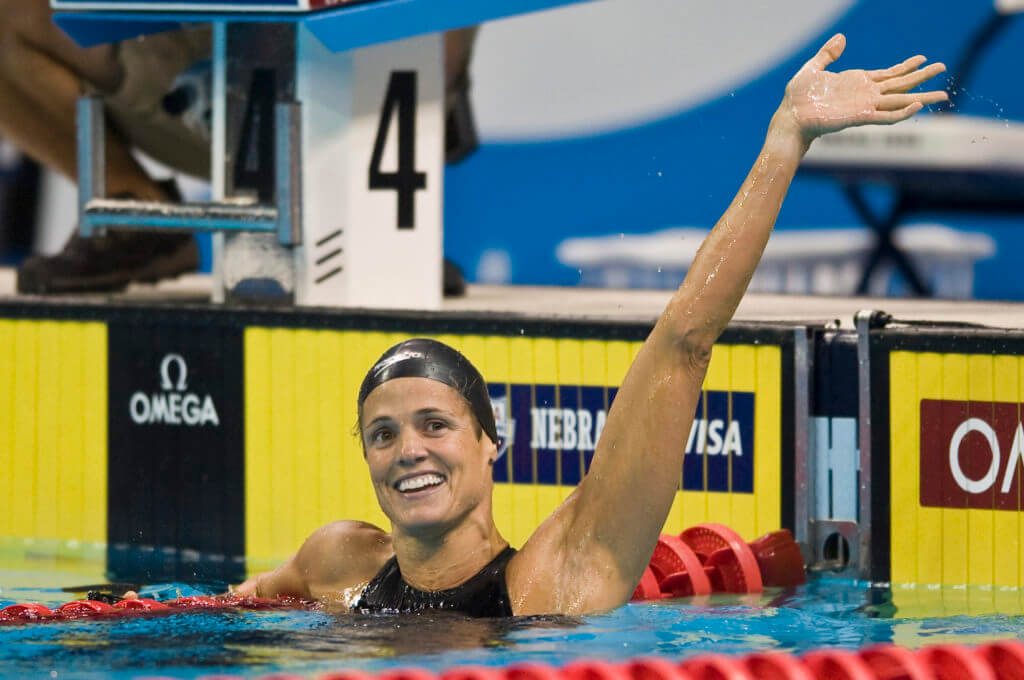Dara Torres’ Inspiring Story is Subject of Documentary: ‘Once Upon a Comeback’ (Review)

Dara Torres’ Inspiring Story is Subject of Documentary: ‘Once Upon a Comeback’ (Review)
Only two American swimmers have ever competed in five Olympic Games.
One is Michael Phelps, who is unanimously regarded as the greatest swimmer of all-time, and competed from 2000-2016. The other is Dara Torres, who competed with Phelps in 2000, and famously took a seven-year break, twice, to make two Olympics after she had already competed in three straight from 1984-1992. Torres arguably had her two best showings at the Games in 2000 and 2008, where she achieved her first individual podium appearance with a bronze in the 100 free in 2000 and a silver in the 50 in 2008. All in all she reached the Olympic podium 12 times in her five trips to the Games.
Dara Torres was the subject of the latest SEC Storied documentary, which aired on SEC Network Monday night, where she detailed the eating disorder she struggled with while swimming for coach Randy Reese at the University of Florida in the late 80s, as well as the doping rumors she endured upon training for the 2008 Olympics. The documentary was an eye opening experience to one of the greatest untold stories in USA Swimming’s history.
In the interviews leading up to the premier 2nite of “Once Upon A Comeback,”I was asked my most proud moment, it’s not about the medals or records, it’s about the road it took to be the best I could be. So honored Lisa Lax, Nancy Stern & the SEC asked me to be a part of this film pic.twitter.com/nvoWDe99CE
— Dara Torres (@DaraTorres) February 22, 2021
Torres’ accomplishments almost seem to go unremembered when mentioning the greatest swimmers of all-time. After all, she is the oldest swimmer to ever stand on an Olympic podium by virtue of her silver in the 50 free at age 41. She is the only swimmer to win an Olympic medal in the same event on five different occasions (4×100 free relay), and was a hundredth of a second away from being the oldest Olympic gold medalist in swimming.
(For reference, Inge de Bruijn is officially the oldest Olympic gold medalist in women’s swimming when she won the 50 free in 2004 two days shy of her 31st birthday).
The documentary reminded the audience that Torres was probably the second biggest figure on that 2008 Olympic team behind Phelps, even ahead of Ryan Lochte, Aaron Peirsol and Amanda Beard, as she had captured the attention of all the “middle-aged swimmers” that were inspired by her ability to still be among the best in the world.
And of course the documentary allowed Dara Torres to open up about the struggles she faced – eating disorder, finding purpose outside of the pool, and the fear of letting her daughter down if she didn’t make it to Beijing. But all in all, the film focused on Torres’ likability in and out of the water – reminiscing on when she helped Nicole Haislett meet Arnold Schwarzenegger in 1992 or when she told the officials to wait for Therese Alshammar before the semifinal of the 50 free in 2008.
The film opened up with an interaction she had in late 2005 when she was pregnant with her daughter Tessa, and was asking to be a member of Coral Springs Swim Club to swim for the late legendary coach Michael Lohberg. At that point, Torres had swum for Mark Schubert, Randy Reese and Richard Quick, so she had established herself as an intense trainer and one of the greatest sprinters of all-time in the US.
But she hadn’t put herself on a pedestal despite these successes she achieved in her career, and never once asked the receptionists at Coral Springs, “do you not know who I am?” The documentary never portrayed her as an arrogant or entitled athlete, although it did point out her fierce competitiveness and obsession to detail that made her so successful in her swimming career, but never as anything less than what your ideal Olympic swimmer should be.
Nor did the documentary dwell on her getting beat in the Beijing 50 free final by 0.01, although with a bigger time window to cover five trips to the Olympics, maybe that would have been more of a focal point. With only an hour to work with, the documentary had its limitations.
But Once Upon a Comeback seemed to almost serve as a reminder to the audience of who Torres was, and why she should be in the discussion for best American swimmers of all-time. Rather than spend too much time focusing on her trials and tribulations, the documentary stayed upbeat and positive in its tone and portrayal of Torres the swimmer, even when she was discussing her eating disorder or the pressure she faced in the leadup to Beijing when doubts were swirling about her ability to get in shape under legal substances.
The documentary allows girls of all ages to be inspired by Torres, from those who have eating disorders, or those who are retired and struggle to find motivation to get back in shape. Torres proved that success is possible even with these obstacles, and that just because you don’t win an individual gold medal, doesn’t mean you are a failure. Success is often defined by personal triumphs and self improvement, and if Dara Torres can reach an Olympic podium after taking seven years off, twice, then she has had one of the most successful swimming careers ever, no matter which color medal she walked away with.



